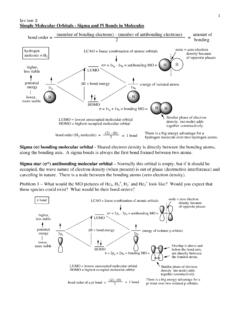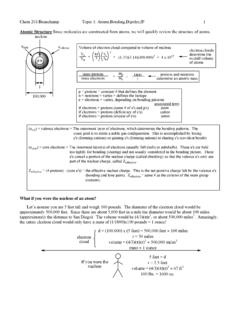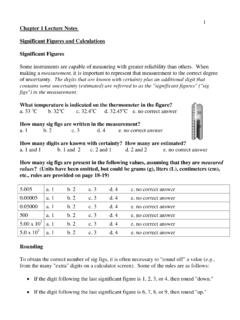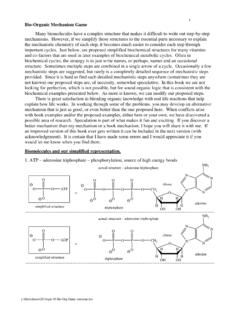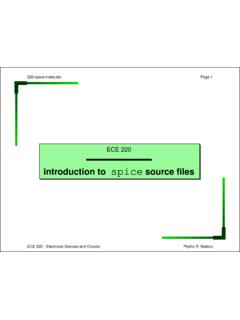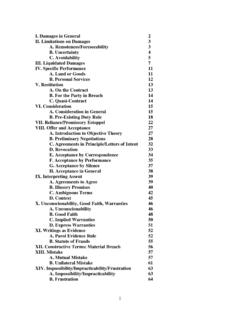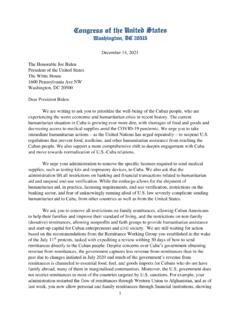Transcription of THE NATURE OF CONTRACT - CPP
1 THE NATURE OF CONTRACT . For the practicing surveyor, CONTRACT law is a most important field of study. Its scope is vast, and to attempt to cover all its ramifications would be incompatible with the purpose of this handout. The effort here will be to treat briefly the various kinds of contracts and their interpretation, modification, rescission, performance, and breach. The definitions of " CONTRACT " put forth over years of slowly changing usage and convenience are legion. Section 1549 of the Civil Code of California defines a CONTRACT as "an agreement to do or not to do a certain thing." The American Law Institute, declares that "a CONTRACT is a promise or a set of promises for the breach of which the law gives a remedy, or the performance of which the law in some way recognizes as a "duty.
2 ". A CONTRACT is an understanding enforceable at law, made between two or more persons, by which rights are acquired on the one side to acts or forbearances on the other. To make an agreement which results in a CONTRACT , there must be an offer and an acceptance; and to the promises which stem from the offer and acceptance the law attaches a binding force of obligation. EXPRESS CONTRACTS AND CONTRACTS IMPLIED IN FACT. These differing terms are used to indicate a variation in the character of the evidence by which the CONTRACT is proved. The same basic elements are essential in both types. Technically, an express CONTRACT is one whose terms are declared by the parties in so many words, either orally or in writing, at the time the agreement is made.
3 An express CONTRACT involves an actual promise, while the implied type is a matter of inference or deduction from facts and circumstances showing a mutual intention to CONTRACT . An implied CONTRACT is an actual CONTRACT , circumstantially proved. unilateral AND BILATERAL CONTRACTS. In a unilateral CONTRACT only one of the contracting parties makes a promise, and that promise is exchanged for an act or an executed consideration. In other words, in a unilateral CONTRACT there is but one promisor, and he or she is the only party under an enforceable legal duty. A bilateral CONTRACT comprises mutual promises, with each contracting party playing the dual roles of promisor and promisee.
4 The legal effects of a bilateral CONTRACT are reciprocal duties and obligations. To put the distinction another way, the exchange for the promise in a unilateral CONTRACT is something other than a promise, while in a bilateral CONTRACT promises are exchanged and there is something on both sides to be done or forborne. JOINT AND SEVERAL CONTRACTS. Whether the rights and duties created by a particular CONTRACT are intended to be (1) joint or (2). several or (3) joint and several is sometimes a difficult question of interpretation. Promises of a number of persons (which promises appear in a single instrument) are presumed to be joint unless a contrary intention is evident from the inclusion of obvious words of severance.
5 Some states have laws declaring that contracts in the form joint shall be joint and several. Where a CONTRACT is joint, the various obligors must all be joined as parties to any action brought upon the agreement, and release by plaintiff of one obligator discharges the others as well. In contrast, each person bound on a several CONTRACT has a liability separate from that of any fellow obligor thereunder, and each individual's obligation must be separately enforced. The distinction between joint and several contracts hinges on the answer to this question: Did all the persons obligated under the agreement promise one and the same performance, or did each one promise only a separate portion of the total?
6 ENTIRE AND SEVERABLE CONTRACTS. A CONTRACT is entire when full and complete performance by one party is a condition precedent to the right to require performance by the other party. In such contracts there is no liability for part performance, and failure of one party fully to perform, relieves the other of any obligations. Where the drilling of a well is to be performed as a whole and the compensation for such work is to be paid as a whole, the CONTRACT is entire, even though the payment is expressed as a stipulated amount per linear foot. And where one party agrees to furnish the other a certain quantity of crushed stone for a fixed price per cubic yard at a stated rate per day, the CONTRACT is entire, requiring full performance before payment of the consideration is due.
7 EXECUTORY AND EXECUTED CONTRACTS. In the executory CONTRACT a party is bound for the future to do or expressly refrain form doing a particular thing as where an agreement is made to build a garage in three months. A fully executed CONTRACT , on the other hand, is one in which the object of the agreement has been performed and nothing remains to be accomplished by either party where an article is sold, handed over, and paid for on the spot. VOIDABLE CONTRACTS. The word "void" means null or ineffectual. Frequently the word is construed as having the more liberable meaning of "voidable." Contracts are properly called voidable which are fully effectual until affirmatively avoided by some act.
8 Such contracts are prima facie valid but are subject to certain defects of which some party can take advantage. By electing to do so, that party avoids the legal relations which the CONTRACT creates or, conversely, by ratification of the CONTRACT may extinguish the power of avoidance. Ordinarily, the power in question is confined to one party to the CONTRACT , but such is not invariable the case. Typical instances of voidable agreements are those involving infants or those which are induced by fraud, mistake, or duress. UNENFORCEABLE CONTRACTS. The law does not enforce such contracts by direct legal proceedings but recognizes them in some collateral way be creating a duty of performance.
9 For example, a perfectly valid CONTRACT may become unenforceable by virtue of a statute of frauds. If there is nothing in writing sufficient to satisfy the requirements of that statute, the direct judicial remedies at common law are not available to plaintiff if the defendant should choose to take advantage of the statutory provision. The oral agreement, however, is far from being without legal operation. Either party has the legal power to make the CONTRACT directly enforceable as against himself by signing a proper written memorandum;. he cannot, by such a process, make the CONTRACT enforceable in his own favor. SUBCONTRACTS. Where a person has agreed to perform certain work, for example, to erect a building, and in turn engages a third party to handle all or part of that which is included in the original CONTRACT , for example, to install the plumbing fixtures, the agreement with such third person is called a subcontract.
10 UNIFORM COMMERCIAL CODE. Of importance in a commercial transaction is the Uniform Commercial Code, a revision and re- codification of statutes dealing with many business subjects, such as negotiable instruments and sales of goods. Adopted on a verbatim basis in virtually every state, the code expressly provides that except to the extent one or more is displaced by a particular clause therein general principles of law and equity involved in any commercial transaction shall be deemed to supplement code provisions. The broad scope of the code is apparent from this commentary: The uniform Commercial Code, as drafted and approved by the National Conference of Commissioners on Uniform State Laws and by the American Law replace the prior uniform acts on Negotiable Instruments, Sales, Warehouse Receipts, Bills of Lading, Stock Transfers, Conditional Sales, and Trust Receipts as well as the nonuniform acts regarding bank collections, bulk sales, chattel mortgages, and factor's liens; would codify the decisional law in relation to letters of credit, and, in addition, would provide statutory authority for the financing of accounts receivable.
